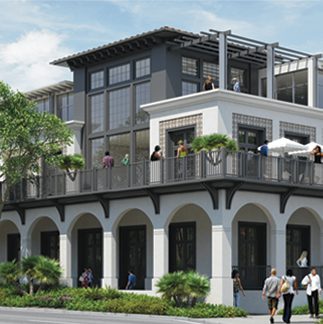On the road again
There’s no backup material for Tuesday’s 5 p.m. special Delray Beach City Commission meeting on Atlantic Crossing, but here’s a reasonably informed look at what the city and the developers hope to get out of the meeting and how it could happen.
The city wants the developers to put back into the project a road that would help with traffic. That road, Atlantic Court, was not in the revised site plan that the commission approved in January 2014. The developers apparently are willing to restore the road, and have put it into a revised site plan, which they have shown to some commissioners. But the developers don’t want to start over the approval process on the site plan. That would take time, and they already have an approved plan, even if some commissioners believe that the developers slipped that approval past them without adequate notice.
So what to do? Commissioner Jordana Jarjura, who is a land-use lawyer, said Delray Beach has no “mechanism” in its code—as some cities do—for amending an approved site plan. The developers, though, could change the plan. But they first would want to hear what the public thought about their proposals.
At regular city meetings, public comment comes at the beginning. Under the format of the special meeting, comment will follow the developers’ presentation. Having a meeting solely about Atlantic Crossing, Jarjura said, “will make it as transparent as possible,” which is important because “there’s been so much distrust.”
True enough. Atlantic Crossing was rushed to approval in December 2012 under outgoing City Manager David Harden. The justified criticism remains that the mixed-use project is too big for the two blocks west of the Intracoastal Waterway on the north side of Atlantic Avenue. Mayor Cary Glickstein believes that the project effectively will cut off Veterans Park. The project would not get approved today.
Nothing about the height and density, though, will change. If the city tried to change the project, a lawsuit would follow, and the city would lose. Delray Beach only can hope to make Atlantic Crossing more compatible. Thus the road.
Originally, Atlantic Court was seen as providing two-way access from Federal Highway. Commissioner Mitch Katz said the plan developers showed him would allow drivers to go west on Atlantic Court from anywhere in the project, but that drivers entering from the east could go only to the parking garage. Katz said he was skeptical of the change, but now agrees with the developers.
Katz said he’s “disappointed” that the developers didn’t make the proposal available on the Atlantic Crossing website before the meeting. “Based on the emails I’m getting,” the public will get its first look today. It also isn’t ideal that some seasonal residents—who might be some of the project’s biggest critics—will be out of town.
Still, after all the division over Atlantic Crossing, if the commissioners, the developers and the public can come to reasonable agreement on a site plan, the meeting will have been a success.
And Uptown…
After discussing Atlantic Crossing, which is at one end of Atlantic Avenue, the Delray Beach City Commission will discuss a major project at the other end of Atlantic Avenue.
That would be Uptown Atlantic. Like Atlantic Crossing, it’s a mixed-use project: 112 rental apartments, 17,200 square feet of office space, a 6,250-square foot restaurant and 44,000 square feet of commercial and retail development. It is proposed for the three blocks just east of the new Fairfield Inn on West Atlantic.
To some, Uptown Atlantic sounds too much like the Delray Beach of the recent past, when the commission gave extra height and density—known as conditional uses—seemingly based more on politics than on what might help the city. Uptown Atlantic seeks a conditional use approval for 18 residential units per acre—a 50 percent increase. The new Land Development Regulations for the Central Business District prohibit such conditional approvals.
Uptown Atlantic, however, was proposed before the city made projects subject to the new regulations. According to the staff report, Uptown Atlantic would generate a lot of traffic—3,000 trips per day. The report also notes that the project is “inconsistent with the objectives and policies” of the city’s comprehensive plan and land-use rules. It would back up to a traditional, single-family neighborhood. There may be setback issues.
Yet Delray Beach has made redevelopment of West Atlantic a priority. The project would displace some old buildings and fill in some vacant lots. The staff report adds that Uptown Atlantic could lead to other redevelopment south of the project, which would help to “fulfill the city’s needs in terms of housing.” In May, the Planning and Zoning Board unanimously recommended approval. I’m guessing that the commission will agree.
One step closer to Houston’s
Boca Raton may soon enter the next stage of the effort to put a Houston’s restaurant on the old Wildflower property.
Mayor Susan Haynie told me Monday that ordinances to allow the restaurant could come before the city council at its next meeting in late July, with public hearings to come in August. “There supposedly is a site plan,” Haynie said. The council would have to approve a site plan and a lease agreement for the city-owned property with Hillstone Restaurant Group. A study is underway to determine traffic solutions for the Northeast Fifth Avenue/Palmetto Park Road intersection. The restaurant would be on the northeast corner of that intersection, along the Intracoastal.
Congress caves
Last week, this area’s congressional representatives caved to organized labor and cast a vote that could hurt the United States.
The issue was President Obama’s request for fast-track authority to negotiate the Trans-Pacific Partnership trade deal. Reps. Ted Deutch and Lois Frankel, both Democrats, voted against the measure. It had passed the Senate. The political story was that so many Democrats denied the president a legacy victory. The important story is that the House—if the vote stands—reduced American influence in Asia at a time when we need a heightened presence to counter China.
The argument from unions is that the deal would cost the U.S. more manufacturing jobs. The sad reality is that even after 63 straight months of job growth, we have not replaced all of the factory jobs the economy lost during the recession. America’s growing industries rely on intellectual property, which the Chinese regularly steal. The Trans-Pacific Partnership—among 12 Pacific Rim nations—would strengthen the fight against such piracy, among other benefits. The deal would not include China.
Deutch’s seat is as safe as any in Congress. Frankel has a near lock on hers. Neither would need to worry about a primary challenge in 2016 from the left. Voting for the trade deal would have been good policy and safe politics.








